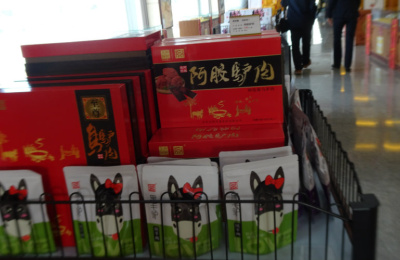Following disturbing reports of donkeys enduring the most terrible suffering after being rounded up and transported long distances to the holding base of slaughterhouses in Brazil, a team from The Donkey Sanctuary went to investigate.
The evidence we found reveals that the international trade in donkey skins, to produce the traditional medicine, ejiao, has now reached South America.
From Africa to Latin America
We joined our colleagues and partners in Brazil — the National Donkey Taskforce, which is a pioneering coalition of animal welfare organisations, government institutions and universities.
It was through the taskforce that we were alerted to concerning reports about the skin trade in Brazil. Until now, most reports about the welfare concerns and unsustainability of this trade have come out of Africa, where working donkeys are being stolen and slaughtered for their skins, leaving communities without the animals on which they rely so heavily.
There is now clear evidence that both owned donkeys and those living in the wild are being targeted for slaughter, and their meat and skin are being exported.

The abattoir holding base
On the first day of the trip, we met Taskforce NGO partners, who shared new video footage of dead and dying donkeys in a holding base right next to a brand new donkey abattoir in Itapetinga in the state of Bahia.
Thanks to this exposure, the holding base had recently been closed down after the authorities decreed it was in breach of environmental standards. The footage showed donkey corpses rotting in the river bordering the land, causing a clear health and safety hazard.
The abattoir, however, was continuing to slaughter over 200 donkeys a day, with trucks delivering the animals regardless of the holding base closure.

The prosecutor
We visited the Public Prosecutor in Itapetinga, who said that while the holding base could be closed down due to environmental concerns, the abattoir had a legal permit to slaughter. He added that any future decisions were at a federal level rather than state level, but that he would remain supportive to the cause of establishing sustainable and humane practices.
Industry insiders
We met industry insiders, who wished to remain anonymous, who revealed there remains a loophole around traceability evidence which is mandatory to ensure export licenses: donkeys either owned and traded or captured from the wild are taken to a licensed facility, a “fake farm” where they are collected for slaughter. This is why it is so difficult to establish from where they originally came.
The truck driver
We met a truck driver, who confirmed he delivered loads of 50 donkeys to the Itapetinga site with three-day, 1,000km journeys from Pernambuco state. There have been reports of animals, including pregnant mares, dying in transit or arriving lame, as well as dying while awaiting slaughter in the holding base by the abattoirs.
The local landowner
We travelled across Bahia state to another abattoir in Amargosa, where we met a farmer who rents his fields by the abattoir as a holding compound for donkey arrivals. He said truckloads of donkeys arriving at the facility tended to be held on his land for 48 hours before being rounded up for slaughter. During our visit, there were only a handful of timid donkeys as the facility had been closed for a month due to a scarcity of donkeys in this part of Bahia state. However, the abattoir was on the point of re-opening, aiming to process 200-300 donkeys a day, and with deliveries from as far as the states of Ceará and Pernambuco, over 1,000km away.
The donkey owner
During our travels, we met a local man leading his working donkey along the dust track near the abattoir. Helio uses his animal to carry water and wood, and opposed the slaughterhouse. He said some people have been offered R$100 (reias) to sell their animals. He said the market value is more like R$500 but he would never sell his donkey, a mare called Boneca, which means “doll” in Portuguese.
The slaughterhouse owner
The most challenging information-gathering exercise was to meet an abattoir owner. Having requested an interview at the guardhouse by the gated entrance of the abattoir, we were told to return the next morning.
But when we did so, a police van rolled up unexpectedly. Five armed officers alighted, came over to us, and revealed they had received a call from the abattoir complaining about the presence of protestors who might be attempting to disrupt a place of business.
The meeting with the owner was not to be, and it remains unclear just how powerful he is in terms of having support from Bahia state officials, whether political or the law.
Growing resistance
The campaign to educate more people about the unsustainability of the trade is gaining momentum. The Taskforce is uniting opinion-formers and decision-makers behind the proposal to suspend the slaughter of donkeys until there is evidence of sustainability. Members include vets, academics, Government ministers and non-governmental organisations including animal welfare and animal rights organisations.
The taskforce is now involving the transport police, given the fact donkeys with untraceable origins travel such long distances to abattoirs. Law enforcement inspection of trucks loaded with donkeys can help establish from where they came, as well as expose the welfare abuses.
There have been several protests against the skin trade in Brazilian cities, with people taking to the streets with banners to help raise awareness of the situation.
We hope the campaign, involving government ministers, animal welfare professionals, the media and public is set to increase pressure on federal and state authorities to address the crisis.
Thank you for your continued support in helping us tackle the biggest welfare issue facing donkeys around the world today.






